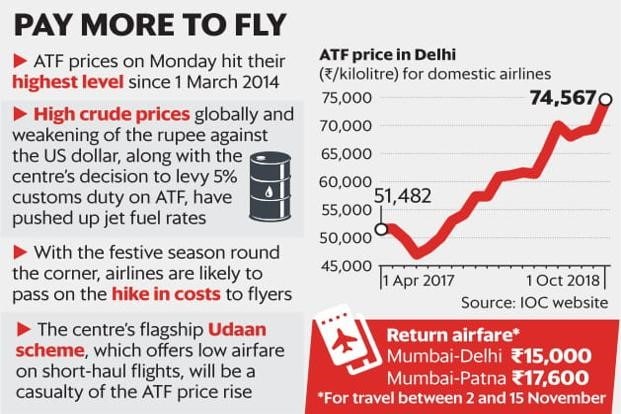India is the fastest-growing domestic aviation market in the world. In any other country, rapid passenger growth would mean booming business for airlines. But in India, the oldest private airline halted operations around three months ago due to a shortage of cash. Rapid growth stands in contrast with struggling airlines. Along with a faulty business strategy, high air turbine fuel costs and cut-throat competition led to the grounding of Jet Airways. Operating an airline is a tough business, it requires deep pockets, but Indian airlines are overtly impacted by the price of ATF. So much so that, even Interglobe Aviation, which runs the country’s largest airline IndiGo, had reported a loss of Rs 652 crores in Jul-Sep last year due to high fuel prices.
Losses and groundings aside, the NDA government extended complete support to the aviation sector in its first term. The period was marked by a boost to regional connectivity and airport development through flagship UDAN scheme. Aviation is a crucial sector for the economy and is expected to attract investments worth over Rs 35,000 crore in the next four years. The government needs to aggressively support the sector and if the proposals in the Union Budget 2019 are taken into consideration, it seems aviation is going to be at the centre of the government’s agenda.

Source: mygov.in
Finance Minister Nirmala Sitharaman announced in the Union Budget that the government is considering increasing the foreign direct investment limit in the sector. Currently, foreign investment is capped at 49% in the aviation sector. The government’s failed bid to sell loss-making Air India in its first term is likely to be one of the reasons to reconsider FDI limits in the sector. Foreign aviation companies have been reluctant to hold a non-controlling stake in Indian airlines, which has guided the investment pattern in the sector. In 2018, the government had tried to sell 76 percent stake in the state-owned airline to cut down on its liabilities. Since 2012, the government had pumped in over Rs 27,195 crore into the national carrier, which led to the company accumulating a debt of nearly Rs 52,000 crore. After the failed bidding process, the government sought a report from the transaction advisor Ernst & Young on the reasons for the failed divestment process. The report had flagged the sale of partial stake as one of the major deal breakers for potential bidders.

The Union Budget 2019 has also proposed to make India a hub of aircraft leasing and financing. This could have a significant impact on the sector as currently all major domestic airlines lease aircraft from foreign countries. Leasing aircraft rather than buying it saves companies from taking an excessive financial burden on their balance sheet. But leasing comes with its own sets of problems. Aircraft leasing companies are mostly based in tax havens, a majority in Ireland. Leasing and financing deals are structured in foreign exchange and any fluctuation in forex affects the airline’s operations as it usually has to pay more for leasing the aircraft. If leasing companies are set up in India and lease rentals are in rupees, substantial foreign exchange can be saved.

Source: Defence ProAc Biz News
Another significant announcement in the Union Budget 2019 that could change the face of the aviation industry and give rise to allied services is the focus on maintenance, repair and overhaul industry. During the budget speech, the finance minister said that the government was keen to provide an enabling ecosystem for the growth of the MRO industry in the country to achieve self-reliance in the aviation sector. The MRO industry has been plagued by skewed tax policy. There is a goods and services tax of 18% on domestic MRO services, while the customs duty on imported MRO was just 5%. A congenial environment can help India become a net exporter of MRO services from an importer and create over 100,000 direct jobs and revenues exceeding Rs 35,000 crore in the next five years.
Conclusion
The government should be applauded for giving much-needed attention to the aviation industry. However, one of the longest standing demands of the industry has been ignored. India has one of the highest taxes on jet fuel anywhere in the world. For Indian airline carriers jet fuel constitutes around 40% of their operating costs. Jet fuel in the country is around 35-40% more expensive than what it costs in other countries due to relatively high taxes. The central government currently charges an 11% excise duty on Aviation Turbine Fuel (ATF) and state-level taxes can go as high as 30%.

Source: Livemint
The government should consider the industry’s demand for bringing jet fuel under the ambit of goods and services tax, which would effectively cap the tax rate at 28%. Transportation coupled with lodging and consumption is a huge industry, it generates millions of jobs and earns billions of dollars as taxes for the government. Ignoring structural problems could lead to another airline falling off the sky, which renders thousands jobless and leaves lenders with non-performing assets.



